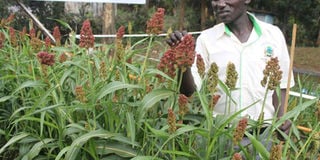Practices that keep grains safe from pests

Stephen Ondimu, an agronomist at the Laikipia County Government in the sorghum farm display during the Mt Kenya ASK Show. As the government promotes the hardy crop as a substitute for maize due to it is nutritious and drought resistance nature, proper storage facilities have to be maintained to store the produce. PHOTOS | MWANGI NDIRANGU
What you need to know:
- Bulk storage of grains always poses challenges to farmers because most of them do not follow laid down preventive measures.
- Grains should be stored in places which are rat and moisture proof. Proper stacking of bags also helps in grain protection. During storage, there are curative measures to be followed.
- Temperatures ranging from 20°C to 40°C accelerates the development of insects.
- Fumigants are chemicals which at required temperature and pressure can exist in the gaseous form in sufficient concentrations to be lethal to a given pest organism.
It is the dream of every farmer to see their stored grains stay longer without pest attack until the next harvesting season or when they get market.
But bulk storage of grains always poses challenges to farmers because most of them do not follow laid down preventive measures.
These measures are important in overcoming problems associated with insect-pest attack.
To begin with, proper sanitation is the foremost aspect in preventive management. To ensure proper hygiene, the threshing floor or yard should be clean and free from insect infestation.
Harvesting and threshing machines also need to be thoroughly cleaned before use. Trucks, trolleys or carts used for transportation of food grains must be cleaned and made free from insect infestation.
Further, storage structures need to be cleaned properly before the storage of newly harvested produce. All dirt, dust, rubbish, sweepings and webbings should be removed from the dryers and stores and destroyed.
All the cracks, crevices, holes existing on the floors, walls and ceiling should be neatly and permanently plastered with mud or cement.
Rat burrows, if existing, need to be closed with a mixture of broken glass pieces and mud and then plastered neatly with mud/cement.
Overall, the grains should be stored in places which are rat and moisture proof. Proper stacking of bags also helps in grain protection. During storage, there are curative measures to be followed.
These can be non-chemical or chemical.
Non-chemical involve ecological conditions. Temperature, moisture content in the grain and oxygen are required for rapid development and multiplication of insects.
MECHANICAL METHODS
By proper manipulation and management of these factors through design and construction of storage structures, ecological conditions unfavourable for attack by various insects can be created.
Temperatures ranging from 20°C to 40°C accelerates the development of insects but above 42°C and below 15°C retards reproduction and development, while prolonged temperature above 45°C and below l0°C may kill the insects.
Grains stored at around 10 per cent moisture content escape insect-attack.
Mechanical methods are also quite practicable. Screening out of broken grains reduces chances of insect infestation. Screening should be done regularly and away from the stores to avoid any re-infestation.
Chemical measures of insect-pest management involve usage of pesticides. They are the most popular and perhaps the most effective one in controlling pests.
The term insecticide can be applied to all chemicals used to kill, control or manage insects. Insecticides capable of immobilising or killing insects quickly are called knockdown chemicals.
They are usually aimed against flying insects but may kill those on surfaces as well as in cracks and crevices.
Such chemicals are pyrethrum spray, lindane smoke generator or fumigant strips. Grain protectants can be mixed with the grains meant for seed purposes only, for example pyrethrum dust
Fumigants are chemicals which at required temperature and pressure can exist in the gaseous form in sufficient concentrations to be lethal to a given pest organism.
Nowadays, a good number of fumigants are used for the control of insects.
Makau is based at the Department of Dairy, Food Science and Technology, Egerton University.




